One of the barriers to feeding your dog a healthy raw diet is finding a vet who supports raw dog food diets.
It’s so much easier to feed your dog a natural raw diet when you can talk openly about it with your vet and get their feedback, support and recommendations.
Unfortunately, some vets are not comfortable recommending a raw diet. Instead, they recommend dry dog food. Often, it’s a brand they carry in their actual office like Science Diet or Royal Canin.
This post is focused on vets who DO support raw dog food and what you can do if your dog’s current vet does not support raw.
This post is sponsored by Darwin’s Natural Pet Products, a company that delivers natural, frozen raw food for dogs and cats.
Learn more about Darwin’s special trial offer here. They offer 10 pounds of raw food for up to 75% off!
IN THIS POST:
- Vets who support raw diets
- Why are some vets against raw dog food?
- How to discuss raw feeding with your vet
- What to do if your vet does not support raw
- How to find a holistic vet
Vets support raw dog food diets
Dr. Darla Rewers is a holistic veterinarian in Seattle who often recommends a raw diet to her clients at Ancient Arts Holistic Veterinary Services.
There’s no single “right” diet for all pets, but she said feeding raw meat and bones can benefit most dogs and cats.
“Raw food, when fed appropriately, is less inflammatory than heat-treated food,” she said. “The long term benefits of feeding fresh foods, whether raw or cooked, often mean less allergies, digestive distress, anxiety and fewer trips to the vet.”
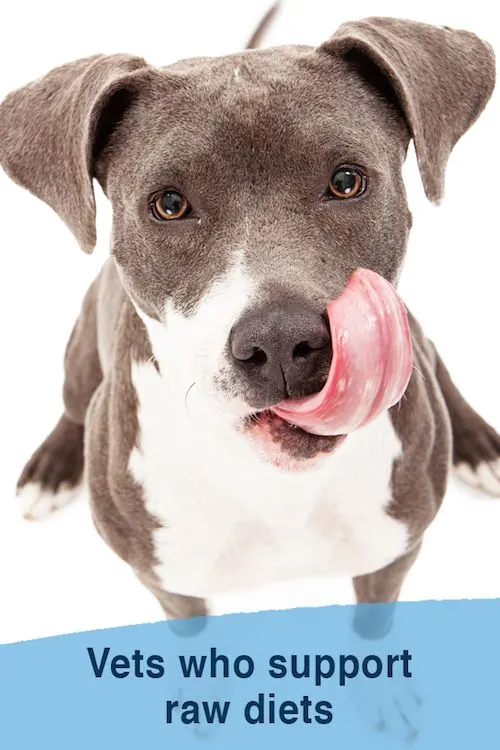
Dr. Jennifer Ramelmeier is a veterinarian with Holistic Vet Services who also supports raw diets. One of the reasons she recommends a raw meat diet for her clients is because it’s easier for dogs and cats to digest.
“Raw meat is what their wild predecessors ate and thus what their digestive system is meant to process,” she said.
Why are some vets against raw feeding?
If you feed your dog a raw diet, then you’ve probably experienced how difficult it can be to find a vet who supports your decision. Hopefully this is changing as more vets and pet owners are familiar with the benefits of feeding their dogs raw.
In my experience, the following are 5 reasons some vets do not support raw diets:
1. Most vets do not have a background in nutrition.
There is a lot of misinformation out there about raw diets as well as a lack of education towards nutrition, Rewers said. “Most veterinarians have one nutrition class during their years of education.”
She explained how big corporations help to supply pet food to vet students while telling the students that a pet’s nutrition is covered with their line of products.
“The class load is ridiculously challenging already. Few students have the time or energy to further their training in nutrition.”
See That Mutt’s post: Why do vets recommend Science Diet?
While Rewers was in vet school at the University of Florida, she said she learned about nutrition through the holistic vet club. They would bring in speakers to discuss raw and home-cooked feeding options.
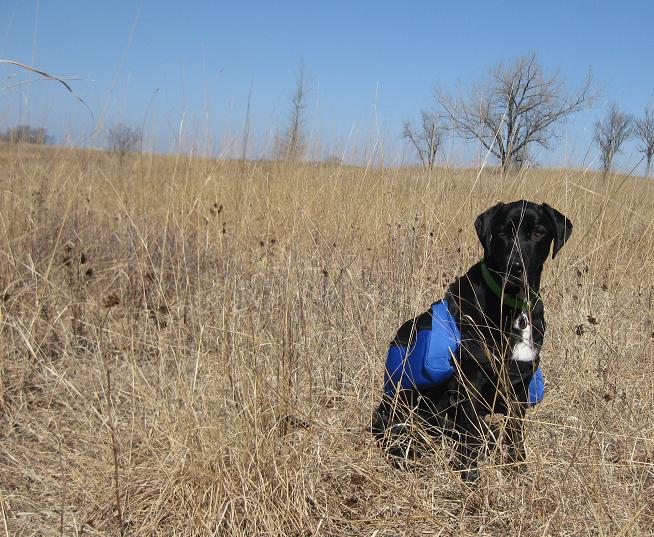
“Holistically minded vets tend to foster more learning in the nutrition department,” she said. “Nutrition is the foundation for all the building blocks of cells in the body.”
Rewers has now been practicing medicine from a holistic perspective for 17 years. She attends the American Holistic Veterinary Conference where there are multiple lectures and classes on nutrition.
2. Some vets fear that dogs will get sick from raw dog food.
“In general, our culture is afraid of bacteria to the point of sanitizing everything to death,” said Rewers. “We need to live in harmony with the good microbes.”
She explained how raw fed dogs have better biodiversity of gut microflora than kibble-fed dogs.
“We are learning that a diverse gut flora is essential for adaptive immune systems,” she said. “Eating real food that is still ‘alive’ in the sense of not completely devoid of all microbes actually is good for the body.”
There’s always a chance a dog could get sick from raw food, but Rewers said this is often because the dog’s gut is not in prime condition due to years of eating overly processed foods.
“Care is needed with any change of diet, but especially from kibble to raw food,” she said. “A transition like this should be overseen by a holistic vet with an interest in nutrition.”
Vets hear stories about the occasional dogs that get sick from raw food because those are the dogs that end up at the vet. The dogs that do not get sick from raw food are not heading to the vet with upset stomachs.
Dogs can get sick from raw meat, but the chances of this are very low.
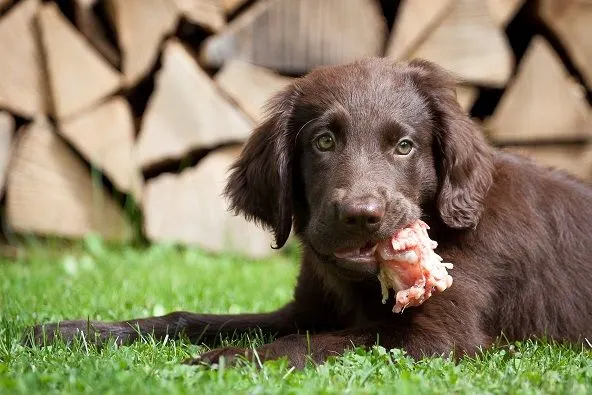
In 15 years of recommending raw diets, Ramelmeier said she has never had one of her patients become ill from raw food.
“I have, however, seen my patients get ill or die from contaminated pelleted diets,” she said, referring to dry dog food.
It’s more likely for the dog’s owner to get sick from handling raw meat because we can’t handle the bacteria as well as dogs can.
Of course, most of us don’t get sick because we use common sense and wash our hands after touching raw meat or eggs. We also wash countertops, bowls, etc.
3. Some vets worry dogs will choke on a raw bone.
Vets only see and hear about the dogs that run into problems with raw bones. They generally don’t hear about the thousands of dogs that eat raw bones with no issues.
It’s up to the owner to feed the dog bones that are safe and to supervise the dog to make sure he is chewing the bone. You don’t want your dog to break off and swallow jagged pieces.
Raw poultry bones are generally safe for dogs because they are soft, pliable and easy to digest. Cooked bones are generally not good for dogs because when bones are cooked they become hard and can splinter or break into sharp pieces.
See That Mutt’s post: Which bones are safe for dogs?
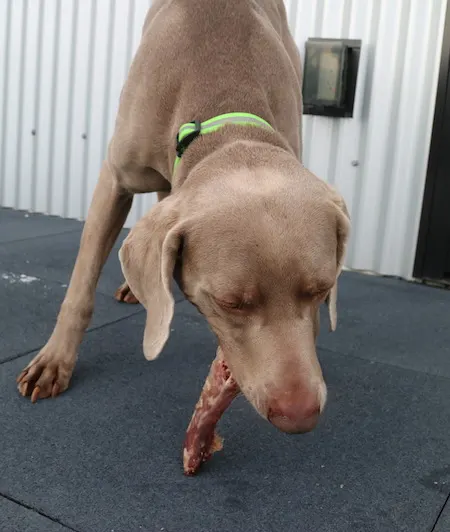
It’s rare for a dog to choke on a raw bone, just as it’s rare for a dog to choke on a toy, bully stick or rawhide. Yet, it can happen.
See our post: Are rawhides bad for dogs?
What happens a little more frequently are things like fractured teeth from chomping on a raw beef bone or a blockage from swallowing a large chunk of bone. For this reason, I only recommend raw poultry bones for most dogs. These are soft and pliable and easy to digest.
*Tip: If you’e worried about feeding your dog raw bones, a ground raw diet from Darwin’s is a good way to go. The raw bones are ground in with the meat. Learn more here.
4. Only a small percentage of dog owners feed raw food.
Veterinarians work with a huge variety of pet owners. The majority of these pet owners are not necessarily interested in feeding a raw diet. I couldn’t find a statistic on what percentage of dog owners feed raw, but I’m guessing it’s less than 5%.
Since most dog owners don’t feed a raw diet (yet!), vets don’t feel the need to bring it up as an option. Hopefully this is changing, but right now a lot of vets likely feel it’s not worth it to invest the time into learning about raw feeding. They’re busy enough already as it is!
Likewise, most dog owners do not want to research how to prepare a homemade raw dog food diet. They also don’t want to take the extra time to make the raw meals. So I get where vets are coming from.
I don’t go around trying to convince people to feed their dogs raw either. Most people simply are not interested, and that’s OK.
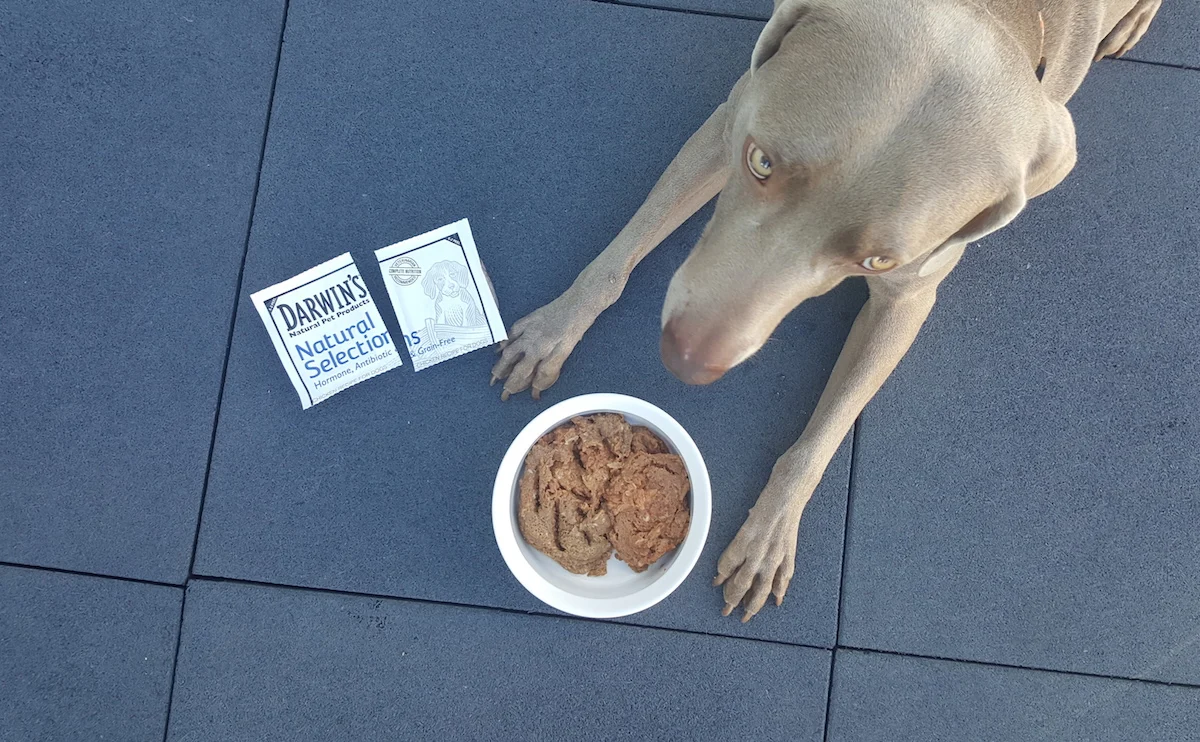
5. Some vets think raw dog food diets are only a “trend.”
One of my old dog Ace’s vets referred to raw diets as a trend.
However, as more people begin feeding raw dog food, vets will not be able to shrug raw diets off as a “fad” any longer.
As people become more informed, they are going to be even more interested in feeding their dogs and cats raw food. More people are switching to a healthier lifestyle and buying more organic food for themselves, their families and their pets. This “trend” is not going away anytime soon.
Which brings me to …
How to discuss raw feeding with your dog’s vet
Hopefully many of you have found wonderful veterinarians who support raw and encourage raw dog food diets. Let me know your experience in the comments section (good or bad).
See my post: Interview with a vet and raw feeder
In general, raw dog food diets are becoming more popular. There are probably 100 different raw dog food companies these days from frozen raw food such as Darwin’s to freeze dried raw options.
This makes it much easier for dog owners to safely feed a balanced raw diet without much effort, however, it’s still important to have a vet on board.
Here are my two suggestions for discussing a raw diet with your vet.
1. Don’t give the vet an opportunity to say no.
Simply, avoid yes or no questions such as, “Do you recommend raw diets?” Or, “What do you think of raw diets?”
These types of questions make it too easy for the vet to dismiss raw and recommend Science Diet.
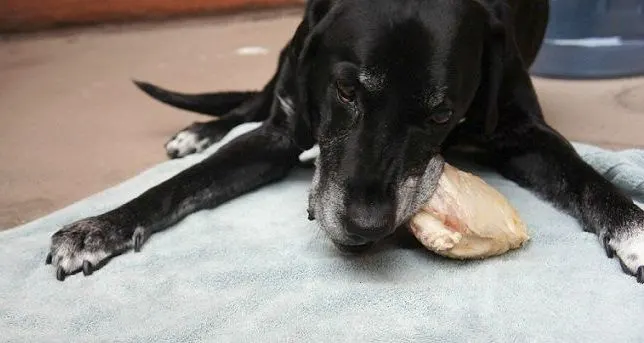
Instead, the discussion needs to start with something like, “I am feeding my dog a homemade raw diet, and I really like how it’s going. Do you have any suggestions?”
Or, “I’m feeding my dog Darwin’s raw food, and it’s going really well. Do you have other clients who feed this brand?”
Talk about raw dog food the right way
Vets are more open to the idea of raw food once they realize you’ve already done your research and are feeding raw already or are seriously thinking about doing so.
Vets care about their clients, and they are generally willing to talk about raw food if they’re approached the right way.
I’ve worked with about 12 different vets over the years between my two dogs and two cats, and I’ve learned to approach the topic by telling them I am feeding my dog a raw diet. I don’t ask them if I should feed raw.
A common response is that the vet will think I need a specific reason to feed my dog raw such as a food allergy. Instead, my current dog Remy has no known allergies at all. I just want to feed him the best diet of real, fresh ingredients.
2. Schedule an appointment to specifically talk about diet.
Diet is usually a three-second conversation during the average wellness exam, right?
“What are you feeding him?”
“Darwin’s.”
“OK.” (Then moves on to the next question.) “Is he on any flea prevention?”
Schedule a 15-min appointment or phone call
You can make a point to bring the attention back to your dog’s diet, but I’ve found it works best to set up a 15-minute phone consultation or an actual appointment to specifically talk about raw food.
This forces the vet to be prepared to discuss raw and to be more open to the idea. It also shows how important it is to you and that you care about the vet’s feedback.
When I originally started feeding my dog Ace a raw diet 8 years ago, I set up a phone call with his vet to talk about the idea. She is a vet who recommends and sells Science Diet, but she was open to talking about raw food. She even gave me some valuable ideas.
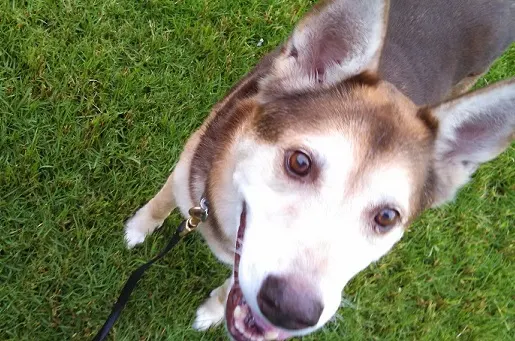
For example, she thought I should start with raw chicken since that is what Ace’s dry food was made from at the time. She also thought I should try the “slow transition” route of mixing the dry food with raw food and gradually weeding out the dry. I did this, and it worked well for us.
She went on to say that some of her clients were already feeding a homemade raw diet and had shown her some of the recipes for feedback.
Had I simply asked her, “Do you think I should be feeding raw?” she probably would’ve said no. But because I took the time to explain my thoughts and she took the time to listen, we were able to find common ground and work together for Ace’s sake.
3. Feed a pre-made balanced raw dog food brand.
I feed my dog Remy balanced raw meals from Darwin’s. I know he’s getting all the minerals and nutrients he needs for a properly balanced raw diet. This is almost as easy as feeding him a dry dog food. I simply open the fridge and unwrap two patties for him at each meal and place them in a bowl. Done!
You can try Darwin’s for your dog and get a great deal through their trial offer. It’s 10 pounds of food for just $14.95. No code required.
It’s scary for some vets when they hear their clients are making their own raw or home cooked meals because these meals may not be properly balanced.
When you’re first discussing a raw diet with your vet, I highly recommend you start out by discussing your favorite pre-made raw brand.
What to do if your vet does not support a raw diet
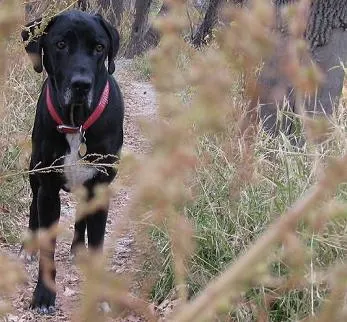
Option 1: Don’t tell your vet you feed your dog raw.
Unfortunately, a lot of dog owners feed raw and decide not to tell their vet about it since it’s so much easier not to. Sometimes it’s not worth the trouble.
This is the approach I’ve taken in the past, and it works OK. I totally get it.
However, it’s unfortunate because then the vet is seeing these healthy animals but thinks they’re eating dry food. It doesn’t help our “cause.”
The vets are only hearing about the “bad” experiences of raw diets when other clients tell them their pets are sick from eating raw meat.
Option 2: Tell your vet and “agree to disagree.”
This is a better option in most cases. Simply tell your vet your dog eats a raw diet, and don’t discuss it much more beyond that. As long as you’re not having any issues, the vet will probably just dismiss your dog’s nutrition.
Option 3: Find a new vet.
If your dog’s vet doesn’t support raw food or if they’re actively against raw feeding, perhaps it’s better to move on and find a different vet. I know some people don’t have that option. If you’re in a small town or rural area, there may only be one vet.
The best way to find a vet who supports raw may be to find local dog owners who feed raw and ask them which vet they use.
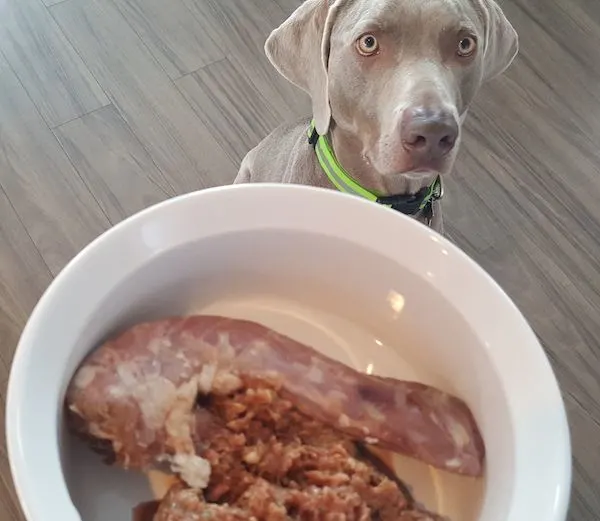
If your area has a natural pet food store, the workers there may also be able to recommend a good vet. Obedience clubs and breeders are other good resources.
How to find a holistic veterinarian
Recently I switched both my current pets from a traditional veterinarian to a holistic veterinarian (who also practices traditional medicine).
I had been feeding my dog a raw diet already without much discussion. However, when my cat was diagnosed with kidney disease, I decided I wanted to feed him a prescription raw diet from Darwin’s instead of the prescription canned food from Science Diet.
See my post: Best diet for cats with kidney disease
Rather than being open to this, my vet told me she would not support a raw diet and would not write me the prescription to Darwin’s kidney support food.
Actually, she directed me to call a nutritionist from Hill’s Science Diet. I did not call them because of course Science Diet is going to recommend its own food, which is dry and canned – not raw.
Holistic vet near me
To find a holistic vet in your area, you can do a google search for “holistic vet near me” or “holistic vet Bozeman” (or wherever you live). There is also this search tool that might help you.
I was fortunate to find a Holistic vet in my town fairly easily who is a much better fit for us. The drive takes me 20 extra minutes both ways, but for the most part that’s doable.
Our other vet was literally only a mile away and would’ve been much more convenient to stay with her office had she only been more open to raw diets.

Our new vet wrote us a prescription for the Darwin’s kidney support formula immediately and is open to feeding both my pets a raw diet. It’s like night and day.
Talking to your vet about raw dog food
What it comes down to is vets should not be ignoring the benefits of raw diets anymore. As dog owners become more and more informed about the importance of real food in their dogs’ diets, more vets are going to be on board as well because that’s what their clients want.
It may seem difficult at times, but we are heading in the right direction.
As Ramelmeier told me, “Raw diets are the gold standard in food for our pets” and we should do our best to get them off dry and canned food if we want them to live longer.
In the comments, let me know your experience talking with your dog’s vet about raw diets. Hopefully it has been a positive experience!


Anne
Wednesday 9th of June 2021
I had this exact experience when I discussed my 10-yr-old Lab's diet with a stand-in vet during her annual exam. She is a young woman vet who is dead against raw diets and recommends the usual 3 because the big companies have a big research budget and have dong loads of longitudinal testing. She disagreed that high cancer rates are related to kibble and said it was dangerous to feed raw. I debated with her and told her my dog has thrived since going raw, her arthritis has lessened (she limps much less) and her coat is softer and healthier. We spent so much time on diet we didn't have time to talk about anything else....
Lindsay Stordahl
Wednesday 9th of June 2021
I ended up switching vets to one who supports raw. I'm lucky I had several options in my area.
AdExPe
Thursday 4th of July 2019
I am sorry but I think that you are wrong when saying that vets do not think about their wallet before thinking about dog health. A sick old dog is the best business for any vet, and who will remember after 10 years that the vet was the one who recommended dry food...?
Tialor
Monday 6th of November 2017
I have been feeding raw for 5 months now and every bit of it is fabulous. The bones scare me, obviously, but there has never been anything serious enough to go the vet over yet. I know it has to happen at some point but I'm not going to now, that's for sure. My dog is a little under weight, my raw feeding got off to a rocky start.. Calculation errors.. However he has maintained his slightly under weight body (with high fitness levels) for a few months now and now I am confident I can start packing on those lbs. No problem. I would like to go to the vet to discuss his raw diet, his weight.. etc.. but I am to scared. I know I can't go back to the vet he's had his whole life. First of all he hates him, second of all I hate him and third is that its a clinic practically sponsored by science diet (my vet was wary of my dog being on a more natural kibble). I have called a few places in town and I have a few contenders but think I might actually wait until his next check up and vaccine update which is mid next year.(Hopefully I can locate a natural/raw vet and travel there) My dog is young and thriving and that's and understatement. I am proud of myself and my dog and I am so confident that this is right (he used to refuse to eat his kibble on a weekly basis and he has never even once hesitated to eat any of the biologically appropriate food he is fed) I don't want to be grilled about every little detail only to be put down by someone who is less educated on my dog and his nutrition than I am. It might be crazy to some but if my dog can survive on dry unregulated trash food from a bag, it can eat my well researched, biologically appropriate food. PS if your scared of doing it just do it, I completely disagree that raw food isn't right for all dogs. (unless your dog has a deadly disease and they have medicated food.. although things like kidney disease and thyroid conditions.. etc are likely reversible via raw food) To say a balance raw diet isn't for all dogs is like saying some humans are just meant to eat hamburger helper and ramen noodles their whole life.. Everyone who is committed to educating themselves, sticking to the diet and is able to afford it should feed their dog raw and remember what this article speaks to, which is-- your vet probably isn't educated on canine nutrition and therefore should not be trusted to give advice on the matter. Trust your gut and your pups smile! (:
klucciel
Thursday 16th of July 2015
Hi
Happy too see this site, but to my dismay I have had an awful experience with a vet who I drove over an hour to see who claims to be homeopathic/holistic. I thought based on my phone screening, she supported raw type diets. But after seeing her, she is not at all for the raw prey model camp. She seems to be going into the BARF camp; supplementing heavily and lots of fruits and veggies. I am a member of rawpreyfeeding groups, but I do some holistic/herbal suppliments within the diet. I started with Pitcairn's raw recipes and my dog had a bought of mange and skin issues. So tapered off that and now do the 80% muscle, !0-15% bone, and 5% liver and 5% organs. I feed pancreas, kidney, and a few others in the 5% group.
I went to the vet because he either has lyme or some type of infection which seemed to stem from a river swim. I am waiting to see blood work results, and hoping it will all be treated successfully. He is having issues with muscle sensitivities on back legs. So what seemed to be mild soreness from over running may soon be due to some other issues. He defininately has some sort of infection, they could not get accurate results because they said his blood was too fatty. Lol, I normally feed 10% lean, and I wasn't thinking, but I had given him some skin on his meaty turkey bones. I don't usually give backs, rarely but unfortunately he had one today.
I am so sorry that raw is getting blamed for health reasons, ecause my dog was doing very poorly on good quality grain free kibble with toppers. He was a mess, and that is why I switched. It has only been a little over a month and I can say, with the fish oil, milk thistle and some other suppliments with limited steamed veggies and say kelp, raw carrots and a few others, he has looked better then ever. His muscles look great, coat is finally getting better and softer, and skin issues have subsided. I just hope the blood work comes back showing only an infection and not something more serious. If so, I understand and truly am also a believer that raw is better.
I have come across another holistic vet that only does acupuncture and nutrition. Supports raw, but is not real familiar with raw prey thinking. But I have done my research, and have slowly introduced more variety of meats. And I agree, dogs drink less water, because the meats have water. They digest better with food that is not dried up to nothing, but added suppliments. It just doesn't seem the same after you go raw w/organs for the vitamin and nutritional value.
Don't give up on raw.
Sarah
Sunday 29th of June 2014
Excuse the spelling errors in my post. Typing in an iphone can be challenging. Lol